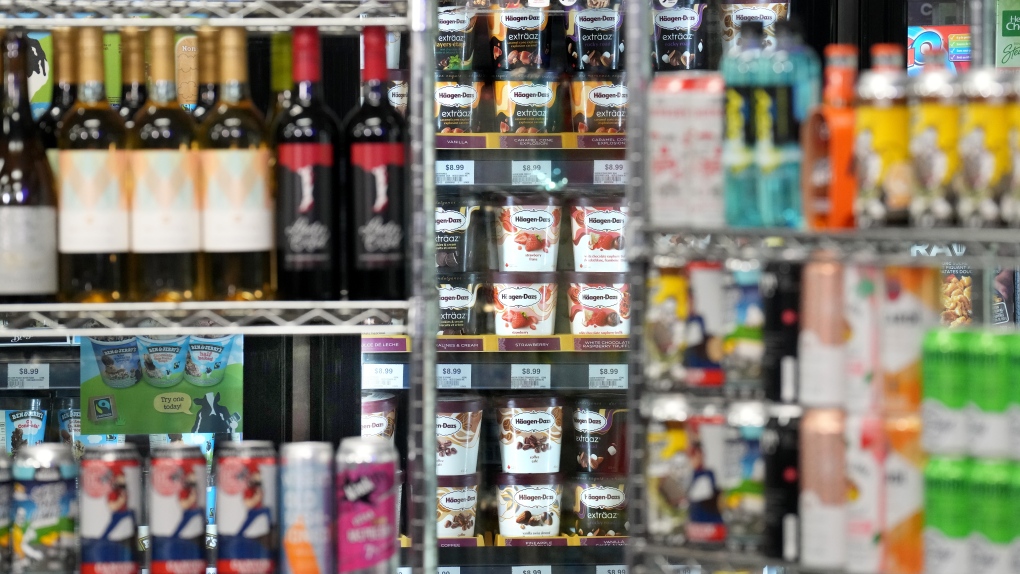Ontario alcohol expansion largest Canadian deregulation policy in decades, report suggests
Ontario’s plan to allow the sale of beer, wine and cider at convenience and big box stores represents “the most substantial alcohol deregulation policy in Canada in decades,” a national medical journal suggests.
The finding was made in an April 8 article published in the Canadian Medical Association Journal (CAMJ), based on new policy that alters how alcohol is sold in the province. The Ford government has previously said the policy changes could allow an additional 8,500 stores to sell alcoholic beverages.
“These changes will result in a 289 per cent increase in the number of alcohol stores in Ontario … (and) will likely reduce the price of alcohol, and will represent the biggest shift in decades with respect to how alcohol is sold in Canada,” the authors of the article write.
- Download our app to get local alerts on your device
- Get the latest local updates right to your inbox
As early as 2026, beer, wine, cider, coolers, seltzers and “other low-alcohol ready-to-drink beverages” will be available for purchase in some big box stores and convenience stores across Ontario, including those located at gas stations.
The province has said these retailers will have to adhere to the same rules set by the Alcohol and Gaming Commission of Ontario, which says that retailers can sell booze between 7 a.m. and 11 p.m., regardless of the hours they are open.
 The Ontario Government announced that in 2026 they will allow sales of beer, wine, cider, coolers and pre-mixed drinks to be sold at convenience stores, grocery stores and "big box" retailers. (THE CANADIAN PRESS/Chris Young)
The Ontario Government announced that in 2026 they will allow sales of beer, wine, cider, coolers and pre-mixed drinks to be sold at convenience stores, grocery stores and "big box" retailers. (THE CANADIAN PRESS/Chris Young)
However, the peer-reviewed CAMJ article suggests the changes will lead to greater alcohol use and associated harms, including deaths, emergency department visits, hospital admissions, interpersonal violence and chronic disease.
Dr. Daniel Myran, one of the authors of the CAMJ article and assistant professor at the University of Ottawa, says that alcohol is estimated to have caused 6,200 deaths in 2020, in addition to 250,00 emergency room visits and just under 50,000 hospital admissions.
Myran estimates the cost of the health impacts related to alcohol is just over $7 billion.
“There's really, really strong and robust evidence showing that the cheaper alcohol is, the more people consume it and the more harms that you see from it.”
The concerns expressed in CAMJ echo those made by Ontario’s Chief Medical Officer of Health in his annual report released earlier this month.
In the report, Dr. Kieran Moore recommended the province adopt a “comprehensive alcohol strategy designed to reduce alcohol-related harms.”
He also noted that if the number of retail outlets selling alcohol increases, the province will need to invest in services to monitor compliance with minimum age laws as well as product promotion, in addition to considering “other measures to reduce potential harms, such as fines and license fees, progressive enforcement up to and including loss of license, and enforcing restrictions related to the distance/ proximity of these outlets to places like schools and daycares.”
Moore said that the expansion of alcohol sales in Ontario in 2015 was associated with a 17.8 per cent increase in emergency department visits attributable to alcohol.
The Ontario government has said it will not be exploring any of the recommendations in Moore’s report.
“We believe in treating people like adults,” the premier said in early April at a news conference.
“You get to go into a retail store, a big box store, and buy a bottle of wine with your steak and maybe a six pack of beer like the rest of the world. That's what we believe in.”
 Ontario Premier Doug Ford attends a press availability at a convenience store in Toronto, Thursday, Dec. 14, 2023. THE CANADIAN PRESS/Chris Young
Ontario Premier Doug Ford attends a press availability at a convenience store in Toronto, Thursday, Dec. 14, 2023. THE CANADIAN PRESS/Chris Young
The CAMJ report suggests that harms could be reduced by ensuring a minimum price for alcohol is established by both federal and provincial governments, and that enhanced warning levels be put on alcohol beverages to increase “consumer awareness of alcohol related harms.”
It also suggests that the federal government review and update regulations on alcohol marketing in Canada.
A spokesperson for the Ford government said that the safe, responsible sale and consumprion of alcohol in Ontario "continues to be a priority."
They also said the government announced an additional $10 million cash infusion to support "social responsibility and public health efforts to ensure alcohol continues to be sold and consumed safely."
CTVNews.ca Top Stories

BREAKING Ontario Premier Doug Ford threatens to cut off energy to U.S. in response to Trump's tariffs
Ontario Premier Doug Ford has threatened to cut off energy supply to the U.S. in response to the tariffs President-elect Donald Trump plans to impose on all Canadian imports.
Elon Musk calls Justin Trudeau 'insufferable tool' in new social media post
Billionaire Elon Musk is calling Prime Minister Justin Trudeau 'an insufferable tool' in a new social media post on Wednesday. 'Won't be in power for much longer,' Musk also wrote about the prime minister on 'X.'
Trudeau will have to 'kiss the ring' to achieve smoother bilateral relations with Trump: John Bolton
If Prime Minister Justin Trudeau wants to get on U.S. president-elect Donald Trump's good side for the sake of a smooth bilateral relationship, he'll likely have to be openly deferential, says former U.S. National Security Advisor, John Bolton.
MAID cases rose to 15,000 in 2023, but growth of cases halved
More than 15,000 people received medical assistance in dying in Canada in 2023, but federal statistics show the growth in cases has slowed significantly.
Luxury real estate brokers charged in federal indictment with sex trafficking in NYC
Two luxury real estate brokers and their brother have been charged with luring, drugging and violently raping dozens of women over more than a decade.
Police locate labyrinth of tunnels connecting tents to generator in Hamilton encampment
Hamilton police say that they discovered a series of 'man-made holes and tunnels' during a patrol of a downtown encampment earlier this week.
Certain foods may disrupt your body's fight against cancer cells, study says
The food you eat may be affecting your body’s ability to fight cancer cells in the colon, according to a new study.
Banks lower prime rates following Bank of Canada move
Canadian financial institutions are lowering their prime lending rates to match the decrease announced by the Bank of Canada.
Toronto agency launches court challenge against new law that would shutter some supervised consumption sites
A social agency that runs a supervised consumption service (SCS) in Toronto’s Kensington Market has launched a court challenge against new legislation that will see 10 such sites shuttered across the province, arguing that the law violates the Charter of Rights and Freedoms.

































